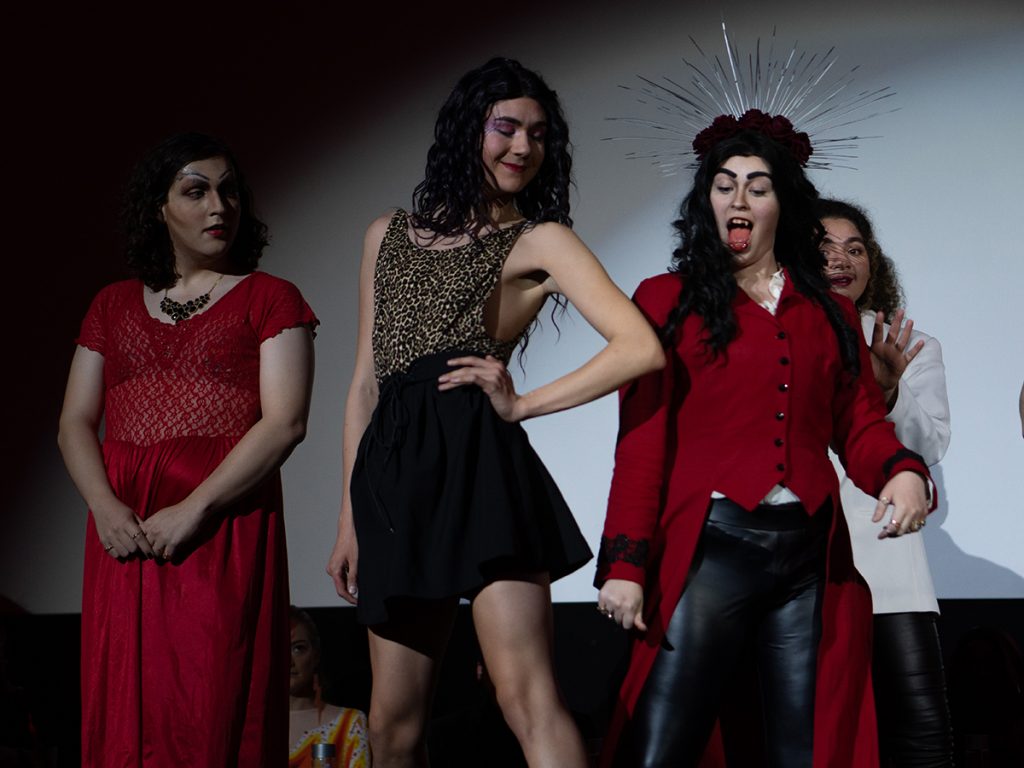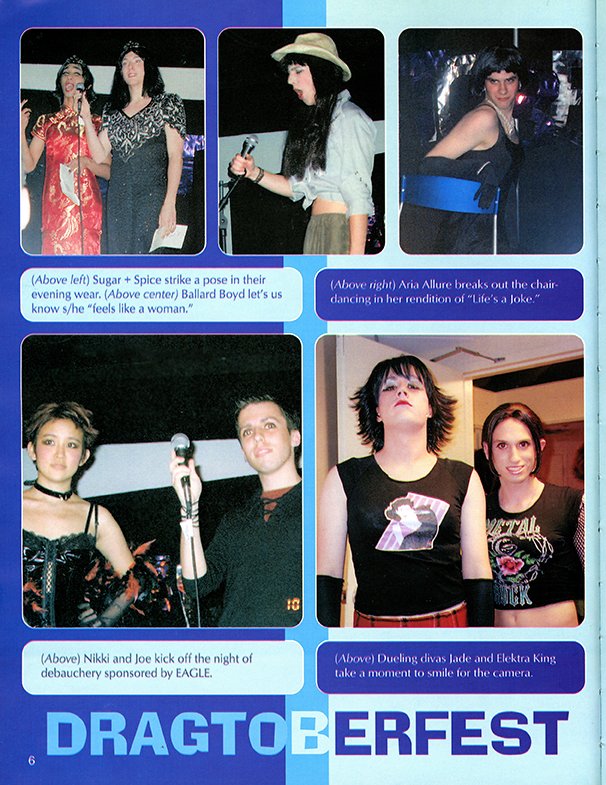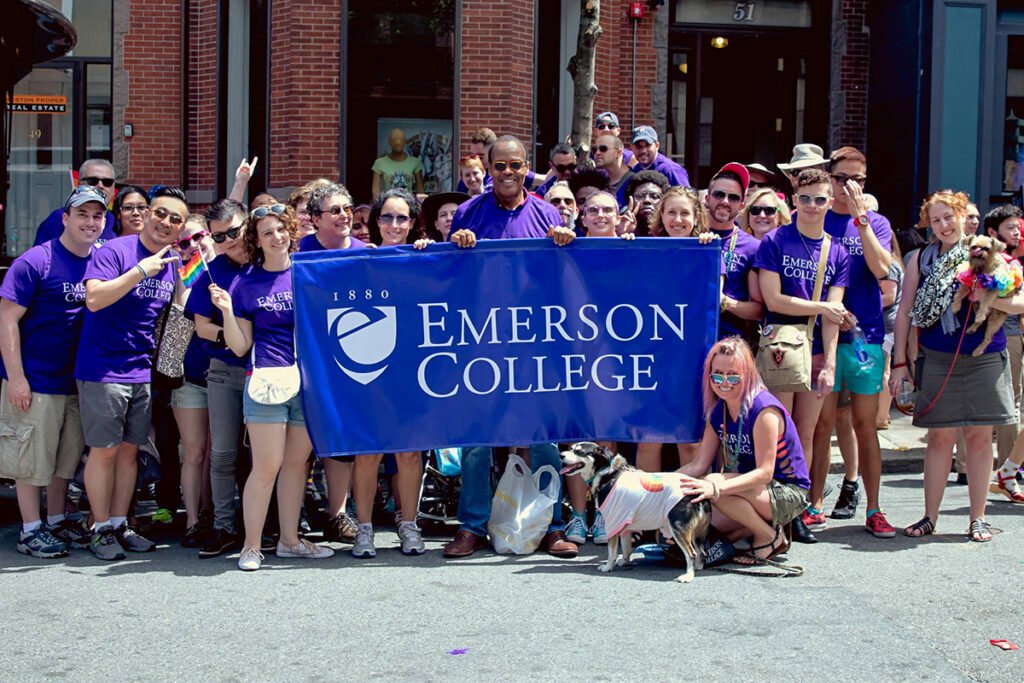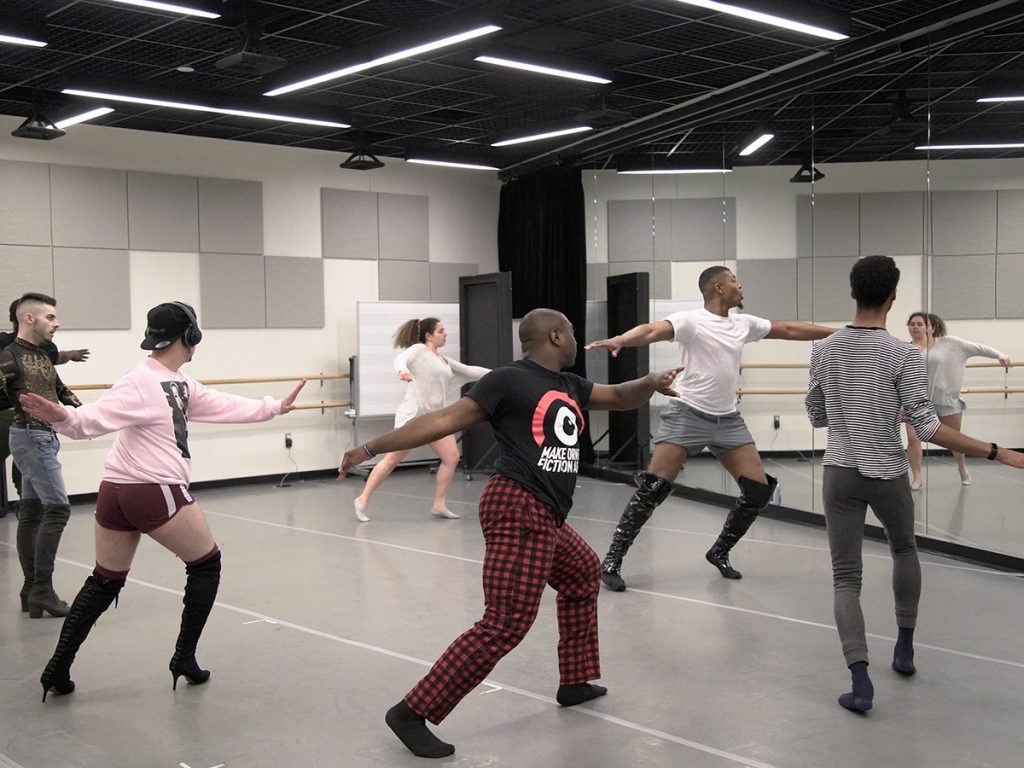The Evolution of Emerson Pride: Part 2

Part 2 of 2
Emerson is well known today as a welcoming place for LGBTQIA+ people, but how did we get here? How can revisiting our past help us understand what progress still needs to be made?
Using resources compiled by Emerson Archives & Special Collections Assistant Director Jennifer Williams and archivists Michelle Romero and Melissa DiBerardino, as well as Emerson Today records, we’ve built a timeline of LGBTQIA+ life at Emerson spanning the past 50 years.
Read: The Evolution of Emerson Pride: Part 1
Disclaimer: This timeline does not claim or attempt to be comprehensive, merely a series of snapshots across the decades that illustrate the ways the LGBTQIA+ community has taken its place on campus.
The majority of information provided by the Archives comes from Berkeley Beacon and Emerson Today articles. Photos, with few exceptions, are from Emersonian yearbooks or Emerson Today. Large gaps in information pertaining to LGBTQIA+ issues/events exist in the records. Terminology is reflective of its time.
2000s

Fall 2001: EBONI, CAPE, EAGLE, and GLBT Student Life facilitate an interactive panel to discuss the intersectionality of sexuality, race, and culture. Called “Shades of Sexuality,” the panel features speakers from organizations around Boston, such as Fenway Community Health, Men of Color against AIDS, and Justice Resource Institute.
Emerson’s Musical Theater Society (MTS) kicks off its first Equity Fights AIDS Week, with events to raise money and educate the public on AIDS research. The events are co-sponsored by AMIGOS, CAPE, EAGLE NSSLHA, Kappa Gamma Chi, Zeta Phi Eta, campus comedy troupes and the Emerson Dance Company.
October 2002: Emerson plans more than 21 events for National Gay, Lesbian, Bisexual, and Transgender Awareness Month, including GLBT Family Dinner Night, new this year. “It will be a great opportunity for people who don’t have support from their parents to meet parents who do support their children,” Crowley said. “Out at Work,” is another scheduled event, involving a panel discussion with alumni and industry professionals to discuss GLBT issues in the workplace.
2010s
September 2013: Junior Journalism students Frankie Olito and Jaclyn Diaz announce the creation of VENT, Emerson’s first LGBTQ+ lifestyle magazine. The magazine will cover topics such as music, fashion, art, and news.
2014: The Robbins Center’s Gender Affirming Voice and Communication Training Program is born. The program helps transgender and gender diverse people in Greater Boston express themselves more authentically through vocal modification.
October 2014: Emerson expands its gender identity options on the Common Application and Universal College Application, stretching beyond the traditional “male” and “female” selections. The new options include genderqueer/androgynous, intersex, and transgender individuals. Applicants who feel that none of the new options apply to them have the option to fill in their own selection. “It makes me happy to see that Emerson is taking strides towards inclusivity,” said Aaron Griffin, co-president of EAGLE, tells the Beacon.
March 2015: Emerson launches eQual, a resource group for LGBTQ+ faculty and staff, along with Fusion, for faculty and staff of color. The groups seek to help members network, educate, and advocate on behalf of their interests in order to advance Emerson’s mission, as well as to raise awareness of Emerson as an employer committed to hiring and retaining a diverse workforce.

June 2015: For the first time, Emerson students, faculty, staff, and alumni, joined by President Lee Pelton, march in the Boston Pride Parade as an Emerson cohort, organized by eQual. “We are known as one of the most LGBT-friendly campuses in the country, and we are finally showing it more in the community,” eQual Co-Chair Eric Glaskin tells Emerson Today.
September 2016: In an effort spearheaded by Vice President for Diversity and Inclusion Sylvia Spears, Emerson makes some campus restrooms inclusive of genderqueer, transgender, and gender-nonconforming individuals. The change includes both single-stall and multi-stall facilities. “You have to understand the story that’s bigger than just the changing restrooms,” said Sylvia Spears.
March 2017: EAGLE announces it will use $1,935 of funds from a Student Government Association appeal to host two weeks of events centered around queer sexual health, education, and awareness. “[The events] intend to provide LGBTQ students and allies with more in-depth education on safer sex and relationships that they may not have [had] access to before, even at such an advanced institution such as Emerson,” Center for Sexual Pleasure and Health Co-President Casey MacPhail tells the Beacon.
September 13, 2018: EAGLE, which previously stood for “Emerson’s Alliance for Gays, Lesbians, and Everyone,” officially changes their name to “Emerson’s Advancement Group for Love and Expression,” maintaining the original acronym. EAGLE President Christopher Henderson-West explains that the change felt necessary to better encompass the queer community today.
“We wanted to do something that really expressed what we do for Emerson and for the community—not just something about who we represent,” Henderson-West said.

October 2018: EAGLE expands its traditional Dragtoberfest lip synch competition into a full drag event featuring workshops, tutorials, vogueing, and photo shoots.
November 2018: LGBTQ students urge fellow students and community members to vote “yes” on Question 3 during midterm elections, a decision which would prevent public spaces such as restrooms, hospitals, and locker rooms from restricting access and discriminating against transgender people. The bill passes, with 68 percent voting yes.
Non-binary students gather for Theyta’s first official meeting. The organization serves as a safe space for non-binary students to talk, make friends, and voice their struggles.
September 5, 2019: Emerson students organize rallies in Boston Common to protest the “Straight Pride Parade,” which LGBTQ+ groups and other critics say is a thinly-veiled effort by people with ties to white nationalist groups to push an anti-diversity agenda.
February 2019: The Princeton Review names Emerson No. 1 in LGBTQ-Friendliness. While the college has increased the number of gender-neutral bathrooms on campus, many students and faculty members push for an official procedure to change pronouns on campus documentation.
Senior Christopher Henderson-West steps down from the elections chair position in the SGA to become the LGBTQIA+ commissioner. The move is intended to help strengthen the bond between SGA and EAGLE. “I know the importance of both, and I know how well they work together and how much could be accomplished,” Henderson-West tells the Beacon.
Spring 2019: EAGLE plans Emerson’s first Vogue Kiki Ball to celebrate the LGBTQ+ community and raise money for LGBTQ+ youth. Kiki balls spring from the queer and trans people of color community, and are frequently sponsored by health centers and community groups – as a ball sponsored by a college, Emerson’s may be a first in the nation, according to EAGLE. The event includes categories such as runway, realness, and voguing. Half of the proceeds will go toward Boston GLASS, a local organization dedicated to helping LGBTQ+ youth of color, while the other half will go to Emerson’s Office of Student Success.
2020s
Fall 2020: Emerson updates Canvas to allow students and anyone using the learning management system to update their pronouns for display. Students also can change their names on many campus records.
June 2021: Emerson launches the Pride Fund, which helps the people, programs, and organizations that support Emerson’s LGBTQIA+ community, fostering a safe and welcoming environment.
Want to learn more? Want to Visit Emerson Pride 2022
Categories